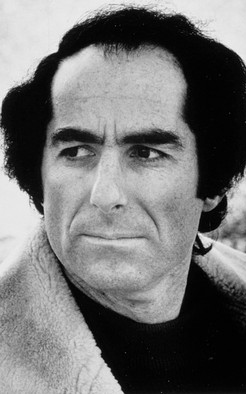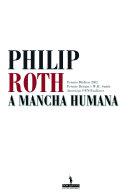Obras
Philip Roth Frases famosas
sobre o candidato republicano à Presidência dos EUA
Fonte: Revista IstoÉ Edição 1617
Portnoy's Complaint
Philip Roth frases e citações
The Human Stain
Portnoy's Complaint
The Ghost Writer
The Human Stain
Portnoy's Complaint
The Human Stain
The Human Stain
The Human Stain
The Human Stain
The Human Stain
The Human Stain
Nemesis
The Human Stain
The Human Stain
The Human Stain
The Human Stain
The Human Stain
The Human Stain
Portnoy's Complaint
The Human Stain
The Human Stain
The Human Stain
Portnoy's Complaint
The Human Stain
The Human Stain
Philip Roth: Frases em inglês
“Stop worrying about growing old. And think about growing up.”
Fonte: The Dying Animal
“The truth about us is endless. As are the lies.”
The Human Stain (2000)
Contexto: There is truth and then again there is truth. For all that the world is full of people who go around believing they've got you or your neighbor figured out, there really is no bottom to what is not known. The truth about us is endless. As are the lies.
“Life is just a short period of time in which you are alive.”
Fonte: American Pastoral
Opening letter to Nathan Zuckerman
The Facts: A Novelist's Autobiography (1988)
Paris Review Interview (1986)
Contexto: You ask if I thought my fiction had changed anything in the culture and the answer is no. Sure, there's been some scandal, but people are scandalized all the time; it's a way of life for them. It doesn't mean a thing. If you ask if I want my fiction to change anything in the culture, the answer is still no. What I want is to possess my readers while they are reading my book — if I can, to possess them in ways that other writers don't. Then let them return, just as they were, to a world where everybody else is working to change, persuade, tempt, and control them. The best readers come to fiction to be free of all that noise, to have set loose in them the consciousness that's otherwise conditioned and hemmed in by all that isn't fiction.
Fonte: Goodbye, Columbus (1959), Chapter 2
Contexto: We came back to the chairs now and then and sang hesitant, clever, nervous, gentle dithyrambs about how we were beginning to feel towards one another. Actually we did not have the feelings we said we had until we spoke them-at least I didn't; to phrase them was to invent them and own them. We whipped our strangeness and newness into a froth that resembled love, and we dared not play too long with it, talk too much of it, or it would flatten and fizzle away. So we moved back and forth from chairs to water, from talk to silence, and considering my unshakable edginess with Brenda, and the high walls of ego that rose, buttresses and all, between her and her knowledge of herself, we managed pretty well.
“No one I know of has foreseen an America like the one we live in today.”
Comparing Charles Lindbergh's leadership of an "America First" movement with that of Donald Trump, in responses to being asked about foreseeing an America such as now exists in his earlier writings, including his alternate-history novel The Plot Against America (2004) where Lindbergh defeated FDR for the presidency in 1940, as quoted in "No Longer Writing, Philip Roth Still Has Plenty to Say" by Charles Mcgrath, in The New York Times (16 January 2018) https://www.nytimes.com/2018/01/16/books/review/philip-roth-interview.html
Contexto: No one I know of has foreseen an America like the one we live in today. No one (except perhaps the acidic H. L. Mencken, who famously described American democracy as “the worship of jackals by jackasses”) could have imagined that the 21st-century catastrophe to befall the U. S. A., the most debasing of disasters, would appear not, say, in the terrifying guise of an Orwellian Big Brother but in the ominously ridiculous commedia dell’arte figure of the boastful buffoon. How naïve I was in 1960 to think that I was an American living in preposterous times! How quaint! But then what could I know in 1960 of 1963 or 1968 or 1974 or 2001 or 2016? … However prescient The Plot Against America might seem to you, there is surely one enormous difference between the political circumstances I invent there for the U. S. in 1940 and the political calamity that dismays us so today. It’s the difference in stature between a President Lindbergh and a President Trump. Charles Lindbergh, in life as in my novel, may have been a genuine racist and an anti-Semite and a white supremacist sympathetic to Fascism, but he was also — because of the extraordinary feat of his solo trans-Atlantic flight at the age of 25 — an authentic American hero 13 years before I have him winning the presidency. … Trump, by comparison, is a massive fraud, the evil sum of his deficiencies, devoid of everything but the hollow ideology of a megalomaniac.
Comparing Charles Lindbergh's leadership of an "America First" movement with that of Donald Trump, in responses to being asked about foreseeing an America such as now exists in his earlier writings, including his alternate-history novel The Plot Against America (2004) where Lindbergh defeated FDR for the presidency in 1940, as quoted in "No Longer Writing, Philip Roth Still Has Plenty to Say" by Charles Mcgrath, in The New York Times (16 January 2018) https://www.nytimes.com/2018/01/16/books/review/philip-roth-interview.html
Contexto: No one I know of has foreseen an America like the one we live in today. No one (except perhaps the acidic H. L. Mencken, who famously described American democracy as “the worship of jackals by jackasses”) could have imagined that the 21st-century catastrophe to befall the U. S. A., the most debasing of disasters, would appear not, say, in the terrifying guise of an Orwellian Big Brother but in the ominously ridiculous commedia dell’arte figure of the boastful buffoon. How naïve I was in 1960 to think that I was an American living in preposterous times! How quaint! But then what could I know in 1960 of 1963 or 1968 or 1974 or 2001 or 2016? … However prescient The Plot Against America might seem to you, there is surely one enormous difference between the political circumstances I invent there for the U. S. in 1940 and the political calamity that dismays us so today. It’s the difference in stature between a President Lindbergh and a President Trump. Charles Lindbergh, in life as in my novel, may have been a genuine racist and an anti-Semite and a white supremacist sympathetic to Fascism, but he was also — because of the extraordinary feat of his solo trans-Atlantic flight at the age of 25 — an authentic American hero 13 years before I have him winning the presidency. … Trump, by comparison, is a massive fraud, the evil sum of his deficiencies, devoid of everything but the hollow ideology of a megalomaniac.
“He had learned the worst lesson that life can teach - that it makes no sense.”
Fonte: American Pastoral
“You put too much stock in human intelligence, it doesn't annihilate human nature.”
Fonte: American Pastoral
Fonte: Goodbye, Columbus and Five Short Stories
“You can no more make someone tell the truth than you can force someone to love you.”
Fonte: Portnoy's Complaint
“Nothing lasts and yet nothing passes either, and nothing passes just because nothing lasts.”
Fonte: The Human Stain

